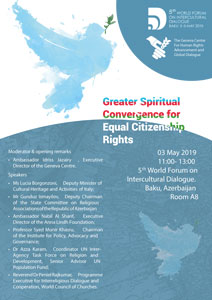On the invitation of the government of the Republic of Azerbaijan, the Geneva Centre organized a conference on the interplay between faiths and equal citizenship rights during the 5th World Forum on Intercultural Dialogue held at the Baku Congress Center from 2-3 May 2019.
The purpose of the conference was to give new impetus to ongoing efforts to harness the collective energy of religions, creeds and value systems in the pursuit of a world living in peace and harmony as well as to eliminate any form of practice that impedes the realization of equal citizenship rights in societies worldwide. The conference contributed to exploring the policy prescriptions required to ascertain the effective enjoyment of citizenship rights celebrating diversity and multiculturalism while consolidating national unity.
Panellists:
- Mr Gunduz Ismayilov, Deputy Chairman of the State Committee on Religious Associations of the Republic of Azerbaijan;
- Ambassador Nabil Al Sharif, Executive Director of the Anna Lindh Foundation;
- Professor Syed Munir Khasru, Chairman of the Institute for Policy, Advocacy and Governance;
- Dr Azza Karam, Coordinator UN Inter-Agency Task Force on Religion and Development, Senior Advisor UN Population Fund;
- Reverend Dr Peniel Rajkumar, Programme Executive for Interreligious Dialogue and Cooperation, World Council of Churches.
Event Summary:
In his opening remarks, the Executive Director of the Geneva Centre Ambassador Idriss Jazairy stated that the present meeting was held as a follow-up to the 25 June 2018 World Conference on religions and equal citizenship rights. “At this international meeting, it was agreed that it is high time that decision-makers join hands to initiate a global effort to ensure that our equally shared humanity is reflected in equal citizenship rights not only in theory but in practice,” highlighted Ambassador Jazairy.
As an outcome to the World Conference, the Geneva Centre’s Executive Director highlighted that more than 50 decision-makers worldwide adopted an Outcome Declaration entitled “Moving Towards Greater Spiritual Convergence Worldwide in Support of Equal Citizenship Rights.” The said declaration, Ambassador Jazairy remarked, appeals to decision-makers to unite in a common endeavour for the preservation of dignity, to contribute to the realization of human rights and to promote the effective enjoyment of equal citizenship rights.
The Geneva Centre’s Executive Director stated that with the adoption of the Joint Document on Human Fraternity for World Peace and Living Together, on 4 February 2019 by HH Pope Francis and the Grand Imam of Al Azhar His Eminence Sheikh Ahmad Al-Tayyib in Abu Dhabi, United Arab Emirates, a growing consensus has emerged on the importance of promoting equal citizenship rights as a vector to peace and stability.
In his statement, the Deputy Chairman of the State Committee on Religious Associations of the Republic of Azerbaijan Gunduz Ismayilov stated that tolerance and respect for the other are integral components of the culture of Azerbaijan. It is not driven – he said – by the need to abide by legal norms as Azerbaijan has for centuries been a multicultural society and a feeling of mutual empathy towards the other.
The Executive Director of the Anna Lindh Euro-Mediterranean Foundation for Dialogue between Cultures Ambassador Nabil Al Sharif presented the endeavours of the Anna Lindh Foundation to promote peaceful co-existence within, and between, societies in Europe and in the Middle East and North Africa (MENA) region. He referred in particular to a handbook entitled “Intercultural Trends and Social Change in the Euro-Mediterranean Region.”
The Chairman of the Institute for Policy, Advocacy and Governance Syed Munir Khasru argued that the world society is witnessing the rise of divisive narratives that reject tolerance and diversity. Although all religions converge in their endeavours to promote a more just, peaceful and inclusive society, the decline of multilateralism and the surge of violent extremism threaten diverse and multi-cultural societies. The recent terrorist attacks in New Zealand and in Sri Lanka are telling examples – he said – of this woeful trend and that injustice is spreading out.
The Coordinator of the UN Inter-Agency Task Force on Religion and Development and UNFPA Senior Advisor Azza Karam remarked that there is an increasing interest in ‘using’ religious leaders to promote freedom of religion and belief (FoRB) or religious liberty issues. “By and large, this emphasis on FoRB is promoted by a handful of western governments. In all cases, the emergence of FoRB as a key area of engagement can often come at the expense of increasing multi-religious collaboration around many other features of human rights and sustainable development concerns,” Dr Karam emphasized.
Programme Executive for Interreligious Dialogue and Cooperation at the World Council of Churches Reverend Peniel Rajkumar spoke about the role of faith actors to convert dialogue on equal citizenship rights into concrete action. He said that the challenge for religions today is to use the cornerstone of pluralism to build just and inclusive communities. However, this task is rendered all the more impossible in contexts where religion has been violently recruited as an ally of populist nationalisms and xenophobia. To overcome this woeful trend, Reverend Rajkumar highlighted the importance of bridging the gap between spiritual will and collective political action. It is no secret – he said – that there are spiritual resources within different religious traditions that remind their followers both of the interrelatedness of the entire humanity and the need to ensure the wellbeing of the ‘other’.
To conclude the meeting, a resolution was adopted supporting the holding of the historical meeting on 4 February 2019 in Abu Dhabi, United Arab Emirates between HH Pope Francis and the Grand Imam of Al Azhar and endorsing the World Conference Outcome Declaration on “Moving Towards Greater Spiritual Convergence Worldwide in Support of Equal Citizenship Rights.”
